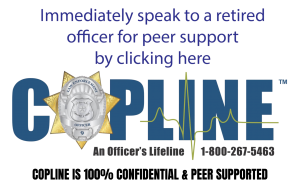THE NEED FOR BANK THE BLUE
Whether it’s being on the front lines in the fight against the Covid-19 pandemic, dealing with unprecedented rates of gun violence or distrust and disrespect from the communities they are charged with protecting, it is a very tough time to be a law enforcement officer in Cook County.
On April 7th during the peak of the Covid-19 pandemic, 21 people were shot in Chicago, including a 5-year-old girl. Eight were killed. It was the deadliest day from gunfire in nearly two years. Constant exposure to devastation, life-threatening situations, and the physical strain of working long hours can lead to multiple mental health issues in police officers.
According to mental health experts, the rates for post- traumatic stress disorder and depression among police officers is five times higher than that of the civilian population and often, it goes untreated. They estimate at least 40 percent of Chicago police officers are struggling with post- traumatic stress, depression and work related trauma. This often leads to issues like substance abuse, and a growing and alarming number of suicides among police officers. According to the U.S. Department of Justice, Chicago’s police suicide rate was 60 percent higher than the national law enforcement average.
Untreated mental health issues can prompt poor decision making on the job that has tragic consequences for citizens, the officers themselves and their families. Those actions often result in lawsuits, costly settlements and verdicts that taxpayers must pay. Mental health issues can also prompt officers to retreat and not be proactive in fighting crime.
Resources for mental health treatment within the Chicago Police Department and other departments in Cook County do not begin to meet the great needs of Chicago area officers. There is also often a culture and stigma that prevents many from seeking help through their departments’ services. Officers often balk at using them for fear of retribution on the job. In order for any treatment to be effective, officers struggling with emotional trauma must be able to talk privately and openly without judgment, fear or retribution. That means getting help outside their departments, which can be daunting for officers. Many have no idea where to go.
In the wake of recent and highly-publicized shootings of both citizens and police officers, trust between the law enforcement officers and the communities they serve has been severely compromised. At the same time, Chicago continues to lead the nation in shootings and murders. Nearly half of all murders go unsolved. Most occur in communities where relations with the police are most strained. Individuals involved in these murders — which are most often gang-related — are rarely caught and convicted. This means they can continue to terrorize their communities, commit crimes with impunity without having to worry about being sent to prison.
Trust between police and local communities must be rebuilt. Police cannot bring the crime rate down unless they can work in partnership with law abiding citizens in our communities. This is especially true when solving violent crimes. Police need the public’s help in solving these crimes. Too often, police are not receiving tips or information from the public that lead to arrests.
The distrust also puts officers more at risk for being attacked or killed. It also hurts morale and mental health among officers. The distrust, harassment and disrespect from the community takes an emotional toll on police officers. This can result in cynicism, burn out, and less engaged, proactive police officers as well as more serious mental health issues.
Police officers often do not have the necessary equipment or safety supplies to do their jobs. Unexpected needs and emergency circumstances occur. The Covid-19 pandemic is a good example of this. Officer do not have basic safety equipment-hand sanitizer, gloves, masks, anti- bacterial wipes etc. In emergency situations and troubled times, our communities need police officers to work long hours and put the community’s needs before those of themselves and their families. That is hard to do without having basic safety supplies.
Due to the nature of their jobs, officers often face more legal issues than people who work in other fields. This includes lawsuits filed against them personally where they are not represented by lawyers provided by their departments or union. Officers fear facing financial ruin defending themselves in legal actions filed against them that often have no merit.

